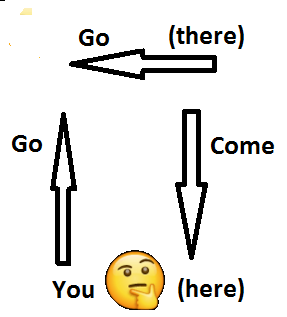Go, Come, Gone, Been:
Go or come?
 This
is just a question of direction.
This
is just a question of direction.
If you are at the place
of the face in the diagram
any movement away is "go".
Any movement towards you is "come"
Any movement from a third location to a fourth is "go".
Exception: on the telephone we "see" ourselves as being with the person on the other end so we say
"I'm coming to see you"
even though you will be travelling away from your location.
We also do this in conversation in similar phrases.
"John will come to your place tomorrow" (providing that the listener is going to be at that location when John arrives)
Gone or Been
In sentences like
"I have been in Paris for three days",
"been" is clearly the perfect tense of "to be".
However when used with "to" it frequently behaves as an alternative perfect participle of "to go".
The difference is curiously simple:
For example:
"John has gone to Scotland."
"John has been to Scotland."
In the first case John is in Scotland now (at the time of speaking).
I the second case John is no longer in Scotland (he is probably back home)
Or the time clause is unfinished and the place where John is now is irrelevant:
"John has been to Scotland three times (this year), (often), (frequently)". etc.
Consider this example which uses both:
"The Union representative has already been to see the manager twice and now he's gone again."